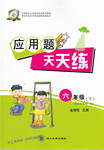题目内容
--- _______did it _______ the conductor to check the tickets this morning?
--- Half an hour.
- A.How soon; take
- B.How long; cost
- C.How often; spent
- D.How long; take
考查情景交际。“今天早上那个售票员用了多久检完了票?”“半小时。”How soon“多久之后”用于将来时;How often对频率提问;How long对时间长短进行提问。花费时间用take,花费钱用cost,spend的主语是人。故选D。

 应用题天天练四川大学出版社系列答案
应用题天天练四川大学出版社系列答案----How did he finish the work?----I hear that he did it __________
| A.in the own | B.on his own | C.of the own | D.all his own |
Mr. Brown was going away for a week. Before he left, he said to his son, "If anyone asks for me, you can tell him that your father has been out for doing something, and will be back in a week, then be sure to ask him to sit down for a cup of tea."
"OK, Dad," said his son. But he was afraid his son couldn't remember this, he wrote these words down on a piece of paper and gave it to him. His son put it into his small pocket, took it out and looked at it every now and then.
Four days passed, but no one came to see his father. The boy thought that there was no man to come and that the piece of paper was of no more use for him, so he burnt it that evening.
The next afternoon, someone knocked at the door. The boy opened it. A man was standing at the door and said, "Where is your father?" The boy put his hand into his pocket at once and looked for the piece of paper. He could not find it. He suddenly remembered he had burnt it, so he shouted, "No more."
The man was very surprised. He asked, "No more? I met your father last week. When did it happen?"
"Burnt yesterday evening."
【小题1】Mr. Brown told his son that _____.
| A.he would be away from home for four days |
| B.he would be back in seven days |
| C.he would be back in a month |
| D.he liked a cup of tea |
| A.the wall | B.the door | C.a piece of paper | D.his son's pocket |
| A.the second day | B.the third day | C.the fourth day | D.the fifth day |
| A.he thought the child's father was dead |
| B.the child didn't ask him to sit down |
| C.the child gave him a cup of tea |
| D.he couldn't find that piece of paper |
| A.The piece of paper | B.Mr. Smith | C.The visitor | D.The boy |
 my
mother?”
my
mother?”